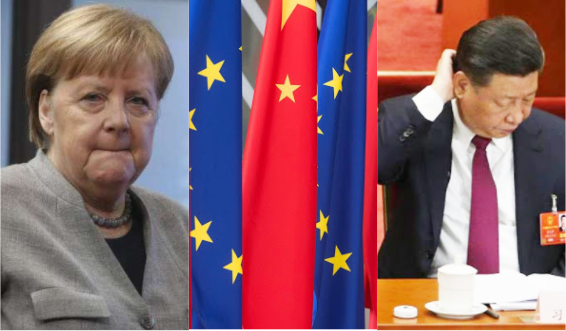The process of decoupling from China is nearing completion as the Communist nation is losing its last major ally in the world- the European Union. Till now, German Chancellor Angela Merkel has been coercing the Brussels-based intergovernmental bloc to keep a soft China policy. But things are changing- Germany’s rotating EU chairmanship comes to an end in January next year and Merkel’s term as German Chancellor is also going to end next year.
With Merkel out of the picture, the European Union’s Foreign Policy chief Josep Borrell has now laid the groundwork for a sharp turn against ‘expansionist’ China. In an explosive opinion piece, Borrell has called China “assertive”, “expansionist” and “authoritarian”, while urging the EU members to “correct” economic imbalances with China before it’s “too late”.
Borrell has equated China with EU’s two main rivals- Turkey and Russia. The top EU diplomat described China as a “new empire” at par with Russia. This is the first time that the EU has officially referred to China as a “new empire”- a step further than the “systemic rival” used last year.
Borrell alluded to Beijing’s expansionist characteristics and said, “Russia, China and Turkey share three common characteristics: they are sovereignists on the outside and authoritarian on the inside,” in an article published in weekly French newspaper Le Journal de Dimanche.
Borrell added, “After 30 years where the European vision seemed to gain ground, the sovereignist vision has regained the upper hand with these new empires.”
Borrell’s remarks are all the more significant because they come at a time when Chinese Foreign Minister Wang Yi is on a Europe visit till September 1. While Beijing is in damage control mode, the top EU diplomat seems to be laying the groundwork for forming a tough and united policy on China.
Borrell hasn’t shied away from encouraging a tough Beijing policy in so many words. He said, “But in order to be able to peacefully negotiate and settle conflicts [with] these new empires, built on values other than our own, we too must necessarily learn to speak what I have called the language of power.”
With such hard-hitting remarks on China, it seems that Borrell is bringing the EU closer to Washington’s policy of marginalising China to contain its growing influence. Of course, Borrell hasn’t aligned EU with Washington officially because Merkel is still the biggest power centre in the EU but the top EU diplomat is essentially positioning Brussels for a major policy shift away from China.
Borrell’s remarks clearly dismiss Beijing’s assurances about a peaceful rise. He doesn’t seem to concede that China is an EU partner for multilateralism; rather the top diplomat is affirming that Beijing is an EU rival.
Therefore, while China keeps asking the EU for a Free Trade Agreement (FTA), Borrell is asking the EU to be careful. He said, “Our relationship is excessively asymmetric for the current level of Chinese development. And that must be corrected.” Elaborating further, Borrell said, “If we don’t do it now, in a few years it will be too late. Chinese products will continue to move up the value chain and our economic and technological dependence will increase.”
Borrell’s remarks also come right ahead of Chinese President Xi Jinping’s virtual summit with European leaders on September 14, during which discussions could take place about an EU-China investment treaty. Borrell is therefore putting more and more pressure on Beijing before the virtual summit so that Brussels can extract as much leverage out of Beijing as it wants.
Moreover, the September 14 summit would be one of the last times when a Merkel-led EU would interact with China. And therefore, Borrell wants to ensure that the EU doesn’t end up giving any advantage to China just before Merkel’s exit.
Borrell’s China stand is in line with the interests of the individual members of the EU. In the ongoing year, several EU members including France, Czech Republic, Slovakia and Estonia have had bitter diplomatic spats and fallouts with Beijing. Yet the EU has failed to stand up for them against the “new empire”. But now Merkel’s leadership of the EU and Germany is about to end, and therefore Brussels is preparing to toughen its China stand.
